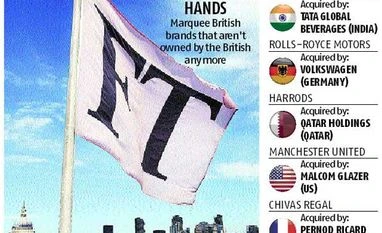Japanese media group Nikkei on Thursday said it would buy the Financial Times from Britain’s Pearson in a $1.3-billion deal that brings together two of the leading financial news operations from Europe and Asia.
The deal marks the biggest acquisition by a Japanese media organisation and is a coup for Nikkei, an employee-owned firm that also lends its name to the main Japanese stock market index.
In the Financial Times, it has acquired a title established in 1884 and first printed on pink paper in 1893 to stand out from rivals. It has been owned by Pearson for about 60 years.
With a reputation for first-class analysis and breaking news, it was one of the first newspapers to charge for its content online and has coped better than most newspapers with the transition to digital publishing.
“I am extremely proud of teaming up with the Financial Times, one of the most prestigious news organisations in the world,” said Tsuneo Kita, chairman and group chief executive of Nikkei. “We share the same journalistic values.”
The Nikkei newspaper, which has a circulation surpassing three million for its morning edition alone, enjoys a must-read reputation for financial and business news in Japan but has struggled to break out of its home market.
The paper, with deep ties to corporate Japan, has also faced criticism for running earnings ‘previews’, considered to be leaks, days ahead of corporate results at a time when Prime Minister Shinzo Abe’s government has been pushing for greater corporate transparency.
As the news broke of the Nikkei deal, an FT journalist tweeted a photograph showing staff in their newsroom crowded around a television watching the developments.
For years, analysts and bankers had been waiting for Pearson to sell the trophy asset, though the names most closely linked with a deal were financial data terminal providers Bloomberg and Thomson Reuters, parent of Reuters news agency.
Earlier on Thursday, Reuters reported the 171-year-old Pearson had finally decided to sell the business daily, as it expanded more into education. That sparked speculation as to who could the buyer be, with the FT itself initially reporting Springer was in the lead, before Pearson and Nikkei confirmed their deal.
The sale of the FT group, expected to be closed in the fourth quarter this year, does not include its 50 per cent stake in The Economist magazine or the London headquarters of the newspaper.
“It is hard to argue with the price,” said Richard Marwood, senior fund manager at AXA Investment Managers, a shareholder in Pearson.
Pearson, founded in 1844 as a small building firm in Yorkshire, was once one of the world’s largest building contractors and has had a long list of varied interests from banking and publishing to owning theme parks and Madame Tussaud’s waxworks. The sale will leave Pearson as the world leader in education publishing and the owner of a 47 per cent stake in publisher Penguin Random House.
The deal marks the biggest acquisition by a Japanese media organisation and is a coup for Nikkei, an employee-owned firm that also lends its name to the main Japanese stock market index.
In the Financial Times, it has acquired a title established in 1884 and first printed on pink paper in 1893 to stand out from rivals. It has been owned by Pearson for about 60 years.
With a reputation for first-class analysis and breaking news, it was one of the first newspapers to charge for its content online and has coped better than most newspapers with the transition to digital publishing.
“I am extremely proud of teaming up with the Financial Times, one of the most prestigious news organisations in the world,” said Tsuneo Kita, chairman and group chief executive of Nikkei. “We share the same journalistic values.”
The Nikkei newspaper, which has a circulation surpassing three million for its morning edition alone, enjoys a must-read reputation for financial and business news in Japan but has struggled to break out of its home market.
The paper, with deep ties to corporate Japan, has also faced criticism for running earnings ‘previews’, considered to be leaks, days ahead of corporate results at a time when Prime Minister Shinzo Abe’s government has been pushing for greater corporate transparency.
As the news broke of the Nikkei deal, an FT journalist tweeted a photograph showing staff in their newsroom crowded around a television watching the developments.
For years, analysts and bankers had been waiting for Pearson to sell the trophy asset, though the names most closely linked with a deal were financial data terminal providers Bloomberg and Thomson Reuters, parent of Reuters news agency.
Earlier on Thursday, Reuters reported the 171-year-old Pearson had finally decided to sell the business daily, as it expanded more into education. That sparked speculation as to who could the buyer be, with the FT itself initially reporting Springer was in the lead, before Pearson and Nikkei confirmed their deal.
The sale of the FT group, expected to be closed in the fourth quarter this year, does not include its 50 per cent stake in The Economist magazine or the London headquarters of the newspaper.
“It is hard to argue with the price,” said Richard Marwood, senior fund manager at AXA Investment Managers, a shareholder in Pearson.
Pearson, founded in 1844 as a small building firm in Yorkshire, was once one of the world’s largest building contractors and has had a long list of varied interests from banking and publishing to owning theme parks and Madame Tussaud’s waxworks. The sale will leave Pearson as the world leader in education publishing and the owner of a 47 per cent stake in publisher Penguin Random House.
)